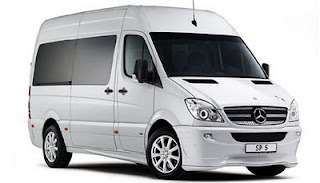
Martin Callanan MEP is using his position as leader of the UK Conservative MEPs to water down environmental legislation in favour of heavy industry, to the expense of small businesses and others.
Last week he pushed through new emissions targets for light commercial vans in the European Parliament that were severely watered down compared to what was originally proposed because of lobbying by auto manufacturers.
70% of new light commercial vans on the market will have to reach a carbon dioxide emissions target of 175g per kilometre from 2014. This will rise to 100% of the fleet by 2017. This represents a cut of just 14% on current emissions standards for these vehicles.
 The cautious level of this cut was attacked in view of the fact that several models already on sale already exceed this standard - with Renault's Master van and Mercedes' Sprinter van (right) having made efficiency gains of 15% and 13% respectively.
The cautious level of this cut was attacked in view of the fact that several models already on sale already exceed this standard - with Renault's Master van and Mercedes' Sprinter van (right) having made efficiency gains of 15% and 13% respectively.Under the vans Regulation if manufacturers fail to reach a target of 147g of emissions per kilometre by 2020 they will be fined up to Euros 95 per vehicle per gram over the limit.
The target originally proposed was 135g per kilometre by 2020.
The European Automobile Manufacturers Association applauded the new law - they would, wouldn't they because it's what they lobbied for.
The bill was sponsored by Callanan who called it a "difficult balancing act" between the needs of the environment and car manufacturers. In fact, he threw his weight firmly on the manufacturer's side.
This is not the first time Callanan, who really doesn't like Europe anyway, has bowed to industry lobbying.
In November 2009 he attacked Liberal Democrat MEPs for "rabid environmentalism with little thought of the consequences (to jobs)" over the issue of giving free carbon emission permits to heavy industry under the European Emissions Trading Scheme after 2012.
He supported the move to give away 40% of all the permits issued, worth a total of €40 billion, to the cement, steel, aluminium and chemical sectors, who argued that making them pay for permits would cause “leakage" of CO2 emissions to countries outside Europe with no environmental benefits.
The Greens/European Free Alliance group in the European Parliament has condemned the legislation on vans. "An already weak Commission proposal on CO2 emissions limits was further weakened by the Parliament and Council, with the full implementation of the initial binding limits delayed until 2017," said German MEP Rebecca Harms, a Greens/EFA group co-president.
She said it was now too weak to stimulate innovation among manufacturers and fell short of the necessary steps to tackle climate change.
Kerstin Meyer, senior campaigner at T&E, a campaign group on transport and the environment, said the legislation was bad news for fleet owners.
"The [auto] industry used a short dip in sales to justify weakening a 10-year strategy to improve fuel efficiency, that would have saved van operators money for many years to come. When vehicle manufacturers cry wolf yet again, policymakers should take a long term view."
She said companies which use this class of vehicles should always look for the most fuel efficient models. "Because CO2 emissions and fuel efficiency are directly linked, weaker emissions standards mean vans will use more fuel. Fuel is a major cost to small businesses who depend on vans to run their operations."
No comments:
Post a Comment